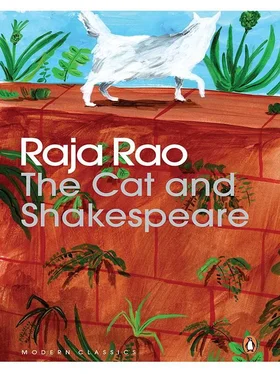Rao Raja - The Cat and Shakespeare
Здесь есть возможность читать онлайн «Rao Raja - The Cat and Shakespeare» весь текст электронной книги совершенно бесплатно (целиком полную версию без сокращений). В некоторых случаях можно слушать аудио, скачать через торрент в формате fb2 и присутствует краткое содержание. Год выпуска: 2014, Издательство: Penguin, Жанр: Современная проза, на английском языке. Описание произведения, (предисловие) а так же отзывы посетителей доступны на портале библиотеки ЛибКат.
- Название:The Cat and Shakespeare
- Автор:
- Издательство:Penguin
- Жанр:
- Год:2014
- ISBN:нет данных
- Рейтинг книги:4 / 5. Голосов: 1
-
Избранное:Добавить в избранное
- Отзывы:
-
Ваша оценка:
- 80
- 1
- 2
- 3
- 4
- 5
The Cat and Shakespeare: краткое содержание, описание и аннотация
Предлагаем к чтению аннотацию, описание, краткое содержание или предисловие (зависит от того, что написал сам автор книги «The Cat and Shakespeare»). Если вы не нашли необходимую информацию о книге — напишите в комментариях, мы постараемся отыскать её.
The Cat and Shakespeare — читать онлайн бесплатно полную книгу (весь текст) целиком
Ниже представлен текст книги, разбитый по страницам. Система сохранения места последней прочитанной страницы, позволяет с удобством читать онлайн бесплатно книгу «The Cat and Shakespeare», без необходимости каждый раз заново искать на чём Вы остановились. Поставьте закладку, и сможете в любой момент перейти на страницу, на которой закончили чтение.
Интервал:
Закладка:
I was not satisfied. But one day the cat came back with a hollowed belly. We never knew where the litter was. She had hidden them somewhere, for we could see the teats were out. We never heard the kittens. One afternoon, however, on the wall was a series of four (or was it five or six?) kittens. They were all ambling along. She carried each one from one spot to the other, lifted them by the scruff of the neck. They neither meowed nor did they paw the air. One by one she took them down the wall.
That was the first time I went across the wall. I found a garden all rosy and gentle. There were bowers and many sweet-smelling herbs, there were pools and many orchids that smelled from a distance. There were old men with beards as long as their knees, and they talked to no one. Young men were in green turbans and others, children and women, sang or danced to no tune but to the tune of trees. Snakes lived there in plenty, and the mongoose roamed all about the garden. I saw deer, too. The air was so like a mirror you just walked towards yourself. How is it I never knew my neighbouring wall went up and down the road, and up again towards the hospital and came back by the bazaar and down towards the Secretariat and back again, covering such a large area, as if I could never have seen where it began and where it ended. I had also met some of my neighbours. That man there is in charge of the temple jewels. This man has a small watch shop in Puttenchantai. This is a famous lawyer and that other was once premier. The school children I recognize well, for I meet them with Usha when I sometimes go to fetch her from her school. How is it I never saw the others anywhere, or when I saw them I did not know they were here, across the wall? The fact of the fact is that I was too lazy to know who lived there. Truly to speak, if Govindan Nair had not come (and with the British bubo and Shridhar the two houses almost became one), I should never have gone beyond my Malayalarajyam and the Government Secretariat, with The Hindu for the evening tea. There would not have been even Shantha (who came to me because she loved the way Govindan Nair and I talked). Truth is such a beautiful thing — a beautiful woman like Shantha loves to hear the truth talked, because it explains her beauty and takes away her responsibility. Lord, how can anyone bear the burden of beauty?
So that day I walked behind the cat. It went down into the kitchen of the White House and left the litter in the corner of the granary room. Then it went up a series of stone steps. Up and up it went, up the staircase. Everybody bowed as if awed. Then I, too, followed it. This time I would not be defeated. I must win, I said. The winning was easy, for I heard a very lovely music. I was breathless. The staircase suddenly turned, and in went the cat. I stood there white as marble. I looked in and saw everything.
I saw nose (not the nose) and eyes seeing eyes, I saw ears curved to make sound visible, and face and limbs rising in perfection of perfection, for form was it. I saw love yet knew not its name but heard it as sound, I saw truth not as fact but as ignition. I could walk into fire and be cool, I could sing and be silent, I could hold myself and yet not be there. I saw feet. They made flowers on stems and the curved hands of children. I smelled a breath that was of nowhere but rising in my nostrils sank back into me, and found death was at my door. I woke up and found death had passed by, telling me I had no business to be there. Then where was I? Death said it had died. I had killed death. When you see death as death, you kill it. When you say, I am so and so, and you say, I am such and such, you have killed yourself. I remain ever, having killed myself.
This was what Govindan Nair meant. This is what Usha meant when she said she saw Shridhar. She did not really, but when she went up, she saw herself and called herself Shridhar. Now I understand. This is also why Govindan Nair never went to prison. When you see the stone of the wall, and stone alone remains, you have no prison. If I say you are and just see you, you are not there. If I go on seeing a point, I become the point. So the prison vanished. And I understood the ration-shop scale where children played. You weigh only that which you seem to weigh, but that which knows neither balance nor weight stands outside of time. Life is so precious. I ask you why does not one play?
I play now building my house of two storeys. I change the beams of black wood to those of teak (people say like this white ants don’t worm them out). I have a flush lavatory on the other floor so that Usha need not come down during the night. Doctors say the evacuating habits of children form their character later. Besides, Shantha and I love each other so much, sometimes she wants to wash because she wants to love even more. How I love the smell of Shantha’s body, it’s like the inner curve of a jackfruit — pouch and honey of wondrous odours, and succulent. Oh, how beautiful the earth is.
The cat’s litter is at my door. Now that Govindan Nair is transferred to Alwaye, I have my responsibilities. I go on feeding kittens. I gave one of them to Bhoothalinga Iyer’s widow the other day. John was gone off to the wars; soon after the knife incident he joined the navy. The battle of Burma was just beginning. His wife, however, came and said: ‘Sir, I hear you have a cat that has wonderful kittens. Could you give me one? My husband was a friend of Govindan Nair.’ I gave her a cup of tea, some cakes, and one white kitten went with her. (Mrs John was called Anita.) The Iyengar lady with big breasts and all that — she also comes. She plays with the cat (and with Usha when she is free) and goes away. She says her house is too small and she has no place for a cat yet. If Govindan Nair were here, he would find her a house. In the Brahmin streets near the temple there are such lovely dilapidated structures. You can buy any one of them and build it anew. It will fetch pure gold after the war. Sir C.P. 15will go and Gandhi-raj will come. In Gandhi-raj everybody will have a house.
I will never build a house three storeys high. Have you ever seen a house so high? No, not in Trivandrum. In Trivandrum, the best houses, those of P. Govardhan Nair or of Jagadish Iyer, retired High Court judge, or even of Raja Raja Rajendra Varma, His Highness’s first cousin, are but two storeys high. You can make nice curved stairways. You could make one in marble, or in polished wood (like in the Royal Guest House at Kanyakumari), but you must always have the terrace open. That is what one calls the third floor. A house always opens into openness. Has anybody seen a house shut out?
I have been made Secretary of the Temple Grants Department at the Revenue Board. From five Secretaries they increased to eight, because of the serious strain of war work. I never see my son Vithal — his mother keeps him away so that her lands will not become mine. Shantha never grumbles and says, I want to marry you. How could one not be married in marriage when you move where there is no movement, you sleep where there is but light? Marriage is not a fact, it is a state. You marry because you see.
Author’s Note
‘Two plus two makes four’ is commonplace arithmetic. ‘When you take away plentitude ( purnasya ) from plentitude, what remains over is plentitude’ is an ancient Upanishadic saying. The problem of meaning is not what you say but from where you say it. Man-centered explications at best end in dithyrambic numbers, in sociological aesthetics, and Truth-turned discourse leads one to silence and so to meaning. The two seem complimentary but in fact the first is exclusive of the second, whereas, not so the second of the first. My friend Govindan Nair (whom you will soon meet) is no enemy of Kirillov (whom you all know) but Govindan Nair is, alas, good Kirillov’s. It is a pity, therefore, that Govindan Nair did not meet Kirillov. It would have been such fun, and — who knows — Govindan Nair might yet have charmed Kirillov into his unbeginning game.
Читать дальшеИнтервал:
Закладка:
Похожие книги на «The Cat and Shakespeare»
Представляем Вашему вниманию похожие книги на «The Cat and Shakespeare» списком для выбора. Мы отобрали схожую по названию и смыслу литературу в надежде предоставить читателям больше вариантов отыскать новые, интересные, ещё непрочитанные произведения.
Обсуждение, отзывы о книге «The Cat and Shakespeare» и просто собственные мнения читателей. Оставьте ваши комментарии, напишите, что Вы думаете о произведении, его смысле или главных героях. Укажите что конкретно понравилось, а что нет, и почему Вы так считаете.












